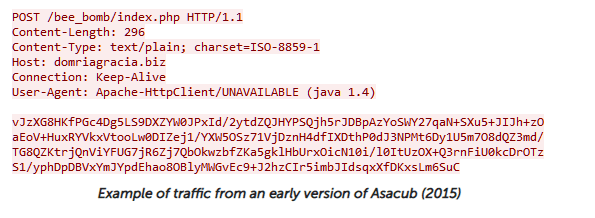Kaspersky Lab has recently saw a large-scale distribution campaign of the Trojan Asacub. According to company’s experts, the number of users who face Asacub reaches 40 thousands daily. Asacub is primarily aimed at Russian users, since the cybercriminals specifically target clients of a major Russian bank. But the Trojan also hit users from Ukraine, Turkey, Germany, Belarus, Poland, Armenia, Kazakhstan, the US, and other countries.
The activity of Asacub mobile banker was first detected in 2015. Over the years the banker has evolved, and its creators have conducted a big campaign for its dissemination. So much so, that over the past year Asacub has held the leading position (38%) among all mobile banking Trojans.
The reason behind Asacub’s continued sustainability lies in the fact that the domains of its command server change, and there are disposable phishing links for downloading the Trojan. The earlier modifications of Asacub were closer to spyware than banking malware: they could steal all incoming SMS messages, regardless of the sender, and upload them to the intruders’ server. The functionality of the latest Asacub modifications, discovered in September 2015 and later, helped intruders get remote control of infected devices, and steal banking data.
Asacub works as follows: the Trojan is distributed through phishing SMS messages, which invite victims to look at a photo or MMS message. When, in their device settings, the victim has pre-set their device to allow installations from unknown sources, Asacub is able to install itself on the victim’s device as the default SMS application.
This means that when a new SMS message arrives, it can transmit the sender’s number and message text to the intruders’ command server. Thus, Asacub can withdraw funds from a bank card attached to the phone by sending SMS messages for transferring funds to another card or phone number, as well as intercepting SMS messages from a bank with one-time passwords.
“The example of the Asacub Trojan shows us that mobile malware can function for several years with minimal changes in its distribution pattern. One of the main reasons for this is that the human factor can be leveraged through social engineering: SMS-messages look like they are meant for a certain user, so victims unconsciously click on fraudulent links. In addition, with regular change of domains from which the Trojan is distributed, catching it requires heuristic methods of detection,” comments Tatyana Shishkova, Malware Analyst, Kaspersky Lab.
To ensure you don’t get caught out by mobile banking malware, Kaspersky Lab recommends following these simple rules:
- Download applications only from official resources;
- If possible, disable the installation of applications from third-party sources in your smartphone settings;
- Do not click on suspicious links from unknown senders;
- Install a reliable security solution to protect your mobile device.
More details about Asacub can be found on Securelist.com



